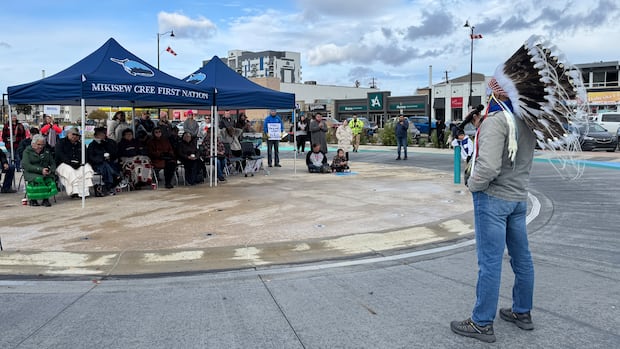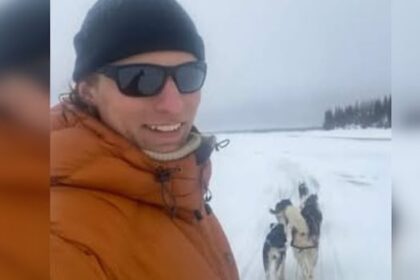EdmontonMikisew Cree First Nation is speaking out against a government-appointed committee’s recommendations for releasing treated oilsands tailings. Province planning to create standards for releasing treated tailings into environmentJesmeen Gill · CBC News · Posted: Oct 24, 2025 9:00 AM EDT | Last Updated: 4 hours agoListen to this articleEstimated 3 minutesChief Billy-Joe Tuccaro speaks at a gathering in downtown Fort McMurray in October 2025 to oppose provincial proposals to release treated oilsands tailings water into the Athabasca River. (Jesmeen Gill/CBC)Mikisew Cree First Nation is speaking out against a government-appointed committee’s recommendations for releasing treated oilsands tailings.Alberta’s oilsands mine water steering committee released a report with its nine recommendations on tailings management last month. One of its recommendations is to expedite the creation of standards to release treated oilsands mine water. Mikisew Cree First Nation, based in northern Alberta, says it opposes the plan’s implementation, worrying it would threaten the health of downstream communities and ecosystems.The First Nation held a rally about the issue last week in Fort McMurray. The event brought together Indigenous leaders, environmental advocates and community members.“Treat and release is a no-go for Mikisew Cree First Nation,” said Chief Billy-Joe Tuccaro.He said collected community data shows higher rates of cancer in Fort Chipewyan. The community is currently involved in a federally-funded study to trace potential contaminants from oilsands operations to better understand the long-term health and environmental impacts. Tuccaro said the First Nation won’t stay idle in the face of decisions that could impact the health of the community. Fort Chipewyan Métis Nation spoke out about the tailings recommendations last month.Tailings are made up of water, sand, bitumen residue and chemicals. They are considered toxic to fish and other wildlife. The province accepted recommendations from the committee, which was tasked with studying tailings management options. The latest environmental mandate letter from Premier Danielle Smith directs Alberta’s environment minister to work with the federal government on establishing release standards for treated water. In a statement, the office of the province’s Ministry of Environment said Alberta cannot “continue to ignore this challenge or let water keep accumulating for 50 more years,” and that any future standards would be developed only after engagement with First Nations and affected communities.”We are reviewing how the committee’s recommendations can be safely and effectively put into practice.”But Indigenous leaders at last week’s rally said that engagement hasn’t happened.“They’re sidestepping the issue at every level,” Treaty 8 First Nations of Alberta Grand Chief Trevor Mercredi said, adding he wants to see more transparency about spills when they happen. “There’s spills that have happened and have drastically impacted the health of our people. … There is no trust, there is no relationship. …”The people in Canada have to know what’s going on here.”Speakers at the rally said they will continue to push for meaningful consultation and uphold their responsibility to protect the land and water.“It’s a very pressing issue that should not be ignored,” Mercredi said. “If they want to move forward with projects and work with the Indigenous people, they have to rectify these issues.”ABOUT THE AUTHORJesmeen Gill is a reporter for CBC News in Edmonton. She is a recent graduate from Carleton University’s journalism program in Ottawa and has previously interned at The Canadian Press. You can reach her at jesmeen.gill@cbc.ca.
Wednesday, 4 Feb 2026
Canada – The Illusion
Search
Have an existing account?
Sign In
© 2022 Foxiz News Network. Ruby Design Company. All Rights Reserved.
You May also Like
- More News:
- history
- Standing Bear Network
- John Gonzalez
- ᐊᔭᐦᑊ ayahp — It happened
- Creation
- Beneath the Water
- Olympic gold medal
- Jim Thorpe
- type O blood
- the bringer of life
- Raven
- Wás’agi
- NoiseCat
- 'Sugarcane'
- The rivers still sing
- ᑲᓂᐸᐏᐟ ᒪᐢᑿ
- ᐅᑳᐤ okâw — We remember
- ᐊᓂᓈᐯᐃᐧᐣ aninâpêwin — Truth
- This is what it means to be human.
- Nokoma











